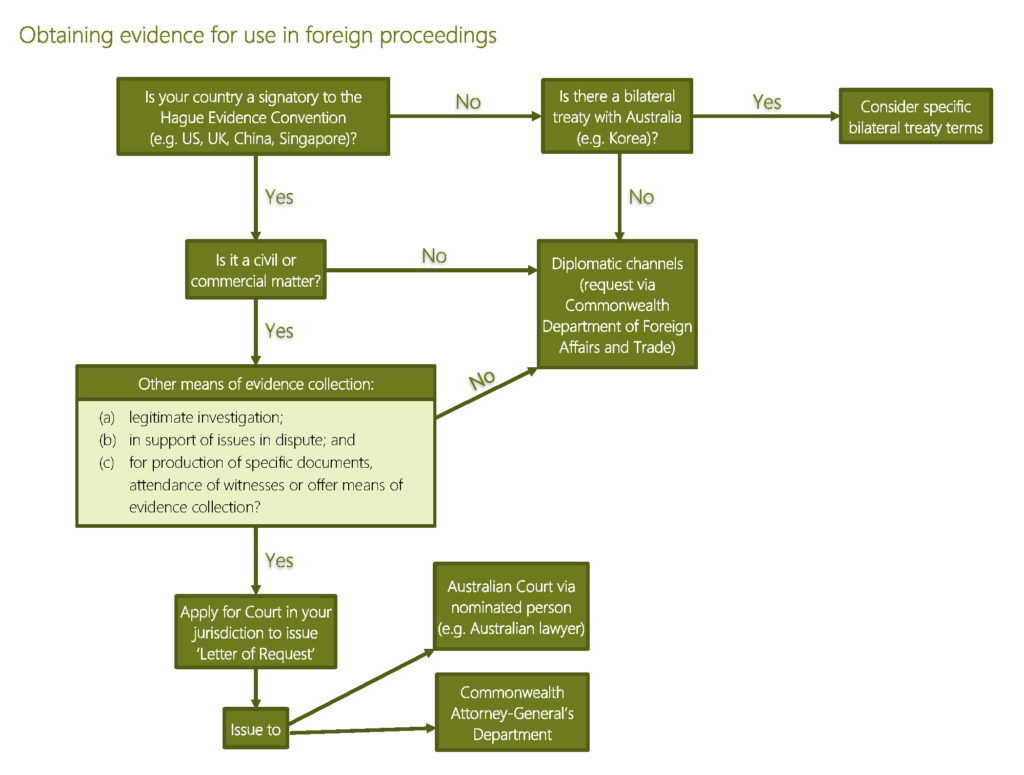How is evidence from a cooperating witness obtained in Australia?
Evidence should be taken in a manner that is consistent with the procedural and evidentiary rules of both the local jurisdiction and the Australian jurisdiction for which the evidence is required.
Can evidence be given by video or audio link?
Evidence can be taken by a witness located in Australia for a foreign proceeding by using video or audio link. The laws of most Australian jurisdictions do not prevent a person from voluntarily appearing in a foreign Court via video link without the involvement of Australian authorities.
Evidence obtained in Australia by compulsion for use in foreign proceedings
Orders may be obtained from Australian Courts to compel a person or corporation to give evidence, either orally or in writing, or produce documents for use in foreign proceedings. Typically such evidence is obtained under the Hague Evidence Convention, a bilateral treaty or diplomatic channels.
The Hague Evidence Convention
Australia is a party to the Hague Convention of 18 March 1970 on the Taking of Evidence Abroad in Civil or Commercial Matters (Hague Evidence Convention) which assists foreign Courts in the collection of evidence. Signatory countries to the Hague Evidence Convention include the US, the UK, France, China, India, Japan, Korea and Singapore.
The Hague Evidence Convention applies only to 'civil or commercial matters' before a judicial authority. Evidence cannot be obtained under the Convention for use in criminal proceedings.
Provided that the matter involves a civil or commercial matter, a party may approach a Court in the country that is a signatory to the Convention (e.g. the US) to issue a 'Letter of Request' under the Convention for an Australian Court to obtain evidence.
Although the 'Letter of Request' will be issued by the foreign court (e.g. the US Court), in practice it will be prepared by the party applying to obtain the foreign evidence.
The 'Letter of Request' typically includes the essential information of the parties involved and the nature of the evidence to be obtained. The 'Letter of Request' must comply with Australia's rules for taking evidence. It is advisable to engage an Australian practitioner to assist with the preparation of the 'Letter of Request.'
Issuing the 'Letter of Request'
The 'Letter of Request' can be issued to either:
- the Attorney-General's Department of the Commonwealth of Australia; or
- an Australian Court via a person nominated for that purpose by the requesting Court (eg. an Australian lawyer).
Where a 'Letter of Request' is issued to the Commonwealth Attorney-General's Department, it is not unusual for such a request to take 6 months or more to be executed. Fees may be charged (by the Attorney-General's Department) for executing a request.
Where the evidence is required urgently, it will therefore be necessary to nominate a local practitioner to commence proceedings in an Australian Court for orders giving effect to the 'Letter of Request'.
Principles that an Australian Court will apply when deciding whether to allow such an application include:
- whether the orders sought are for an illegitimate investigation rather than to obtain evidence for use in a civil or commercial matter before a judicial authority; and
- the stage at which the order is sought, and whether the party seeking the order is able to demonstrate that the information sought is capable of being used.
Upon a successful application the Australian Court may order the production of documents, the attendance of witnesses for examination and other means of evidence collection.
Much like a deposition, or the examination of a witness at trial, questions and documents may be put to a witness during the examination.
No discovery categories ordered
Importantly, an Australian Court will not make unrestrained orders for the production of documents by categories or by reference to specified issues in dispute. An Australian Court will only make an order for specific identified documents to be produced. Preliminary or pre-trial discovery will also not be ordered.
Bilateral treaties
Australia is party to a number of bilateral treaties, including with Korea, Thailand and the UK. These bilateral treaties govern obtaining evidence from Australia for use in foreign proceedings in those countries.
Diplomatic channels
A diplomatic channel is generally used to transmit requests where there is no agreement or treaty in place between Australia and the foreign country. Requests are submitted to the Commonwealth Department of Foreign Affairs and Trade. There may be fees associated with the execution of the request.

The content of this article is intended to provide a general guide to the subject matter. Specialist advice should be sought about your specific circumstances.




